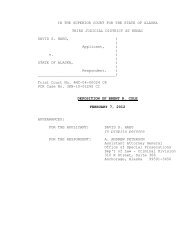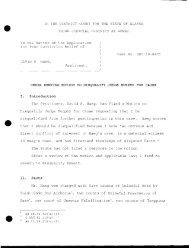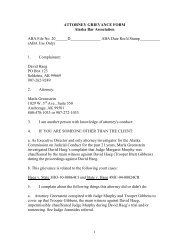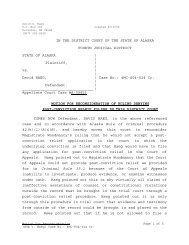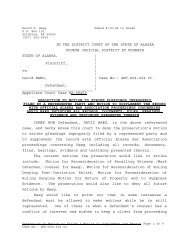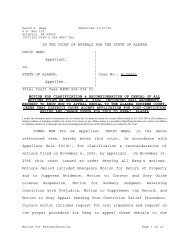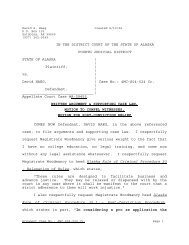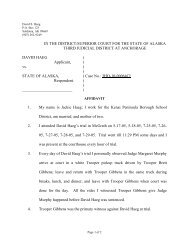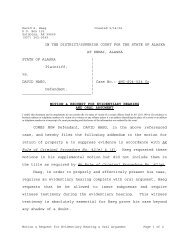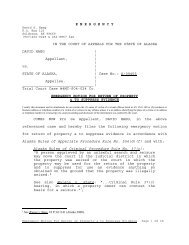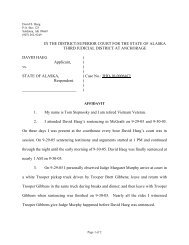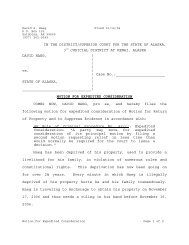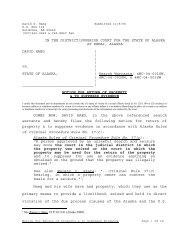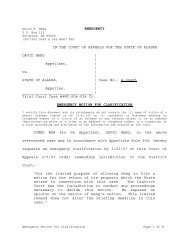PCR Exhibits - Alaska State of Corruption
PCR Exhibits - Alaska State of Corruption
PCR Exhibits - Alaska State of Corruption
You also want an ePaper? Increase the reach of your titles
YUMPU automatically turns print PDFs into web optimized ePapers that Google loves.
A criminal defendant has a right to waive counsel and represent himself. McKaskle v.<br />
Wiggins, 465 U.S. 168, 104 S.Ct. 944,79 L.Ed.2d 122 (1984); Faretta v. California, 422 U.S.<br />
806, 95 S.Ct. 2525, 45 L.Ed.2d 562 (1 975); McCracken v. <strong>State</strong>, 518 P.2d 85, 90-9 1 (<strong>Alaska</strong><br />
1974); Lampley v. <strong>State</strong>, 33 P.3d 184, 189 (<strong>Alaska</strong> App. 2001) (trial court properly denied<br />
defendant's request to represent himself based in part, upon repeated threats to harm trial judge).<br />
In order to be granted pro se representation, a defendant must clearly and unequivocally express<br />
his desire to represent himself. Faretta, 42 U.S. at 835, 95 S.Ct. at 2541. This constitutional<br />
right applies at trial but not to appeals. Martinez v. Court <strong>of</strong> Appeals <strong>of</strong> California Fourth<br />
Appellate Dist., 120 S.Ct. 684, 692, 528 U.S. 152 (2000) (a criminal defendant has no federal<br />
constitutional right to represent himself on appeal). As the Faretta court recognized, the right to<br />
self-representation is not absolute. The defendant must “voluntarily and intelligently" elect to<br />
conduct his own defense, 422 U.S., at 835, 95 S.Ct. 2525 (quoting Johnson v. Zerbst, 304 U.S.<br />
458,464-465, 58 S.Ct. 1019, 82 L.Ed. 1461 (1938)), and most courts require him to so in a timely<br />
manner. He must first be "made aware <strong>of</strong> the dangers and disadvantages <strong>of</strong> self-representation."<br />
422 U.S, at 835, 95 S.Ct. 2525. A trial judge may terminate self-representation or appoint<br />
"standby counsel” – even over the defendant’s objection – if necessary. Id. 834 n. 46, 95 S.Ct.<br />
2525. The Supreme Court has further held that standby counsel may participate in the trial<br />
proceedings, even without the express consent <strong>of</strong> the defendant, as long as that participation does<br />
not "seriously undermin[e]” the "appearance before the jury" that the defendant is representing<br />
himself. McKaskle v. Wiggins, 465 U.S. 168, 187, 104 S.Ct. 944, 79 L.Ed.2d 122 (1984).<br />
Additionally, the trial judge is under no duty to provide instruction on courtroom procedure or to<br />
perform any legal "chores" for the defendant that counsel would normally carry out. Id. at 183-<br />
184, 104 S.Ct. 944. Therefore, the government's interest in ensuring the integrity and efficiency<br />
<strong>of</strong> the trial at times outweighs the defendant's interest in acting as his own lawyer. 120 S.Ct. at<br />
691.<br />
Courts disfavor self-representation. Not even the Faretta majority attempted to argue that<br />
pro se representation is wise, desirable or efficient, and some waive his right to a fair trial. 120<br />
S.Ct. 691 n.9. The Supreme Court has found, that although the right to defend oneself at trial is<br />
“fundamental,” representation by counsel is the standard, not the exception. Patterson v. Illinois,<br />
487 U.S. 285, 307, 108 S.Ct. 2389, 101 L.Ed.2d 261 (1988) (noting the "strong presumption<br />
against" waiver <strong>of</strong> right to counsel). The Supreme Court recently noted that "a pro se defense is<br />
usually a bad defense, particularly when compared to a defense provided by an experienced<br />
criminal defense attorney." 120 S.Ct. at 691.<br />
Given this strong bias against pro se representation, the waiver <strong>of</strong> the right to counsel is<br />
not unlike a change <strong>of</strong> plea. In making these determinations, a trial court must also advise a<br />
defendant <strong>of</strong> his right to counsel, the importance <strong>of</strong> having counsel, and damages <strong>of</strong> proceeding<br />
without counsel. Evans v. <strong>State</strong>, 822 P.2d 1370, 1374 (<strong>Alaska</strong> App. 1991). Not only must the<br />
trial court explain in detail the advantages <strong>of</strong> legal representation, but it must be satisfied that the<br />
defendant understands those knowing and intelligent waiver, the Court <strong>of</strong> Appeals will reverse a<br />
259



